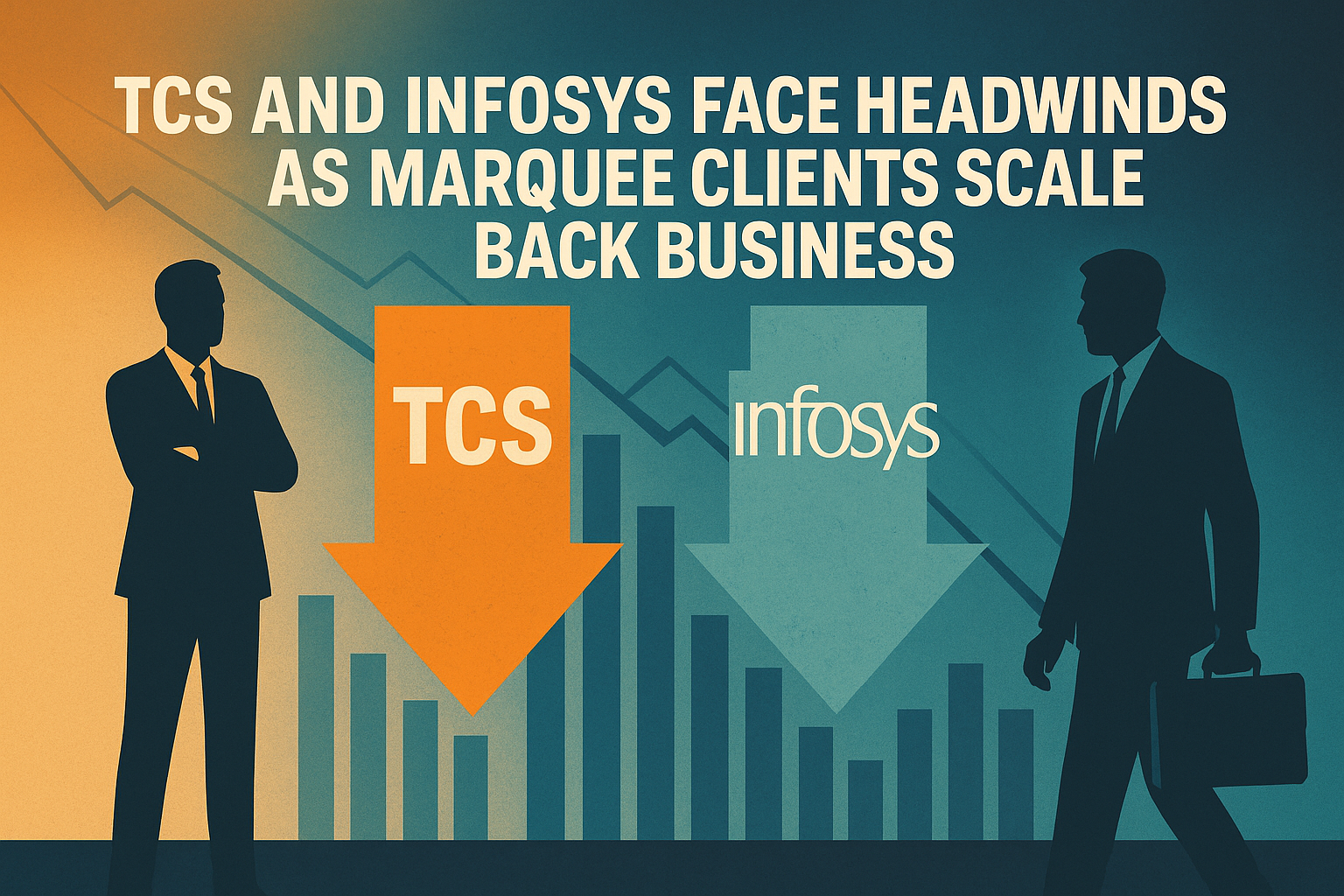India’s two largest IT services exporters—Tata Consultancy Services Ltd (TCS) and Infosys Ltd—are navigating turbulent waters. Amid rising global uncertainty, both firms reported lower revenue from some of their marquee clients during FY25, reflecting a broader trend impacting the entire Indian IT services industry.
TCS: The Erosion of Strategic Accounts
Citibank and Postbank Pull Back
TCS, headquartered in Mumbai, witnessed a noticeable decline in business from Citigroup Inc. and Postbank, the retail banking arm of Deutsche Bank AG. Both clients are among TCS’s top 30 accounts, with Citibank even featuring in the top five.
The impact is starkly evident in the performance of TCS E-Serve, a subsidiary established after TCS acquired Citi’s back-office operations in 2009. In FY25, TCS E-Serve’s revenue nosedived by 31% year-on-year to $155 million, driven entirely by Citibank’s reduced outsourcing. Revenue from the account plummeted from $96 million to just $27 million—effectively wiping out nearly 70% of the subsidiary’s revenue stream.
German Setback: Postbank Systems
TCS also saw diminishing returns from TCS Tech Solutions GmbH, the rebranded Postbank Systems AG, which it had acquired from Deutsche Bank in 2020 to cement its foothold in Europe. Revenue from this unit fell 33% year-on-year to €126 million, marking the second straight year of contraction. This follows Deutsche Bank’s decision in late 2023 to shutter nearly half of Postbank’s 550 branches, pivoting to digital banking—undercutting the need for IT services TCS provided.
At a macro level, TCS’s revenue for FY25 grew by just 3.78% to $30.18 billion, the slowest pace in four years. This sluggish performance is partly attributed to such top-client scale-downs. With nearly one-third of TCS’s business tied to banking and financial services, the implications are far-reaching.
Infosys: Daimler’s Decline and Deal Drought
Subsidiary Stumbles
Infosys too found itself grappling with a revenue contraction in its German automotive subsidiary—Infosys Automotive and Mobility GmbH, primarily serving Daimler AG. After years of 40%+ growth, revenue from this arm shrank 8.5% to $418 million in FY25.
This decline marks a key turning point. The $3 billion, eight-year deal Infosys struck with Daimler in 2020 was a flagship win under CEO Salil Parekh’s leadership. Yet, the losses have mounted steadily. The Daimler unit has remained unprofitable for four consecutive years, a rarity for Infosys’s usually high-margin operations.
Struggles with Mega Deals
Infosys clocked overall FY25 revenue at $19.28 billion, growing just 3.85% year-on-year. But behind the modest uptick is a significant concern: the waning of large transformational deals, particularly those exceeding $1 billion in value. Like TCS, Infosys appears to be struggling to win such mega contracts—further complicating growth prospects.
Industry-Wide Ripples: Smaller Firms Aren’t Spared
The slowdown isn’t isolated to TCS and Infosys. Mid-tier IT firms are feeling the strain too:
- Hexaware Technologies Ltd is expecting reduced business from Fannie Mae, one of its top three accounts.
- Mphasis Ltd lost a portion of its FedEx business to Accenture Plc.
- Microsoft trimmed its outsourcing partnerships with LTIMindtree Ltd and Sonata Software Ltd.
These examples suggest that budget tightening and vendor consolidation among global clients are reshaping the outsourcing landscape.
Conclusion: Turning Point for IT Majors
The drop in high-value accounts for TCS and Infosys signals more than a cyclical blip—it may be an early indicator of a strategic realignment in the global IT sourcing paradigm. As companies prioritize AI, automation, and digital self-sufficiency, the traditional outsourcing model is under stress.
For TCS and Infosys, the path ahead involves recalibrating deal strategies, reinvigorating innovation, and aggressively pursuing new-age opportunities—even as they shore up relationships with existing clients. The era of guaranteed year-on-year growth from legacy accounts might well be over.
Feel free to share your experiences and insights in the comments below. Let’s continue the conversation and grow together as a community of traders and analysts.
By sharing this experience and insights, I hope to contribute to the collective knowledge of our professional community, encouraging a culture of strategic thinking and informed decision-making.
As always, thorough research and risk management are crucial. The dynamic nature of financial markets demands vigilance, agility, and a deep understanding of the tools at your disposal. Here’s to profitable trading and navigating the election season with confidence!
Ready to stay ahead of market trends and make informed investment decisions? Follow our page for more insights and updates on the latest in the financial world!
For a free online stock market training by Yogeshwar Vashishtha (M.Tech IIT) this Saturday from 11 am – 1 pm, please sign up with https://pathfinderstrainings.in/training/freetrainings.aspx
Experience profits with my winning algo strategies – get a free one-month trial with ₹15 lakh capital! – https://terminal.algofinders.com/algo-terminal
Disclaimer
This article should not be interpreted as investment advice. For any investment decisions, consult a reputable financial advisor. The author and publisher are not responsible for any losses incurred by investors or traders based on the information provided.


